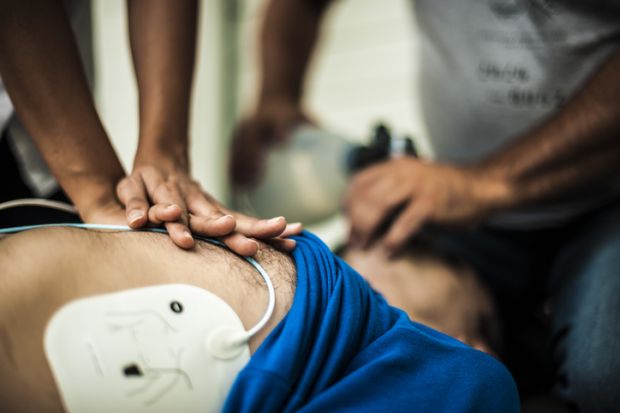Monday 5 December 2022 was just like any other day for me – until it wasn’t.
I walked my son to school, taught my class for the day, participated in two committee meetings and answered a dozen or so emails to students, staff and other faculty. The air was crisp as I then set off to pick up my son, only to suddenly find that I couldn’t walk straight.
It seemed, at first, like a momentary oddity for my feet to fail to behave the way they had for the previous 38 years. Four or five steps later, though, my vision also shut down and I fell against a wall.
For some time thereafter, there was nothing. No time went by, no thoughts occurred, no sounds registered. Unconscious, I was rushed to hospital, where I spent the night in the emergency room before being admitted to the cardiology ward for 12 days.
In all, I stayed in the hospital for a total of almost a month between 5 December and 1 March and underwent three surgical procedures, including six hours of open-heart surgery and the installation of a defibrillator. But five surgical chest scars and $700,000 (£551,000) of hospital expenditure later, I am back in my classroom.
I’m not myself yet: I still suffer from chest pain and I can’t climb stairs like I used to. But I’m on my way. I am teaching my senior students how to be mathematicians before they leave us to accomplish great things. I am attending department and committee meetings and helping my peers again with union work. And, today, I made changes to an article and resubmitted it – fine, Reviewer 2, you win!
While these tasks give me great satisfaction and relief, they are a strong reminder of the privileged position I hold as a full-time tenure-track faculty member. I know that, although my recovery still has a long way to go, I will be OK.
Even at my worst moment, when the doctors could not tell me for sure that I would live, I knew that I had a medical disability leave – so, as long as I got healthy, I would have a job to return to. I knew that, regardless of how high my medical bills rose, I had high-quality insurance that would cover most of it. When doctors talked to me about intubation and explained that it was possible that they might, accidentally, break one or more of my teeth as they inserted the breathing tube into my windpipe, I knew that my dental coverage could fix it. In short, the network of benefits and financial support structures that I had as a tenure-track academic meant that all I had to worry about was my rehabilitation exercises.
But my chest had contained this silent time bomb – a leaking valve and thick heart walls due to a hidden genetic defect – my whole adult life. Luckily for me, it went off in 2022 and not in 2016, when I was still an adjunct and graduate student. Had it happened then, my job would have been lost. My family’s income would have disappeared overnight. The hospital bills would have crippled us and most likely pushed us into bankruptcy – a common occurrence throughout the US. Any broken teeth would have had to stay broken.
Then, as now, I was the sole provider for my wife and my three children, and I taught at least as much as many full-time faculty members. Yet not only did I earn very little as a graduate teaching assistant and adjunct faculty member, a situation that is not remotely unusual, I did so with no benefits to speak of. For most US universities, it seems, a deathly ill adjunct is just a body to be replaced in the classroom.
And yet adjunct faculty represent more than 60 per cent of higher education faculty – and rising. They contribute as much to the well-being of our institutions as tenure-track faculty do, mentoring our students and teaching the same courses. They deserve the same protections and sense of security that we have. They should be provided with disability leave, health insurance and dental care as routinely as they are pay cheques.
I am beyond thankful for the benefits that my current privileged position provides me, but I worry about my adjunct brothers and sisters. If we can’t take care of our own faculty in their greatest time of need, how can universities meaningfully contribute to guiding society to a better tomorrow?
Josh Hiller is associate professor of mathematics and computer science at Adephi University, New York.
Register to continue
Why register?
- Registration is free and only takes a moment
- Once registered, you can read 3 articles a month
- Sign up for our newsletter
Subscribe
Or subscribe for unlimited access to:
- Unlimited access to news, views, insights & reviews
- Digital editions
- Digital access to THE’s university and college rankings analysis
Already registered or a current subscriber? Login








